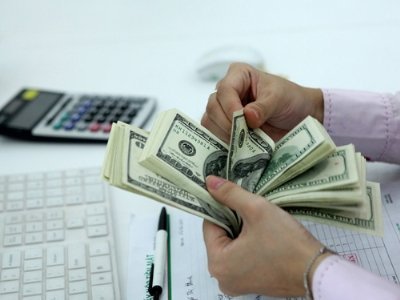VietNamNet Bridge – The foreign currency market has heated up again when credit
institutions begin collecting dollars. The pressure on foreign currency reserves
and dong/dollar exchange rate is believed to be harder in the time to come.

According to the Governor of the State Bank of Vietnam Nguyen Van Binh, the
central bank has bought nine billion dollars since the beginning of 2011, which
means that 180 trillion dong has been pumped into circulation.
The move of putting dong into circulation and withdrawing dollars from
circulation then helped better banks’ liquidity and has led to the continued
interest rate reductions recently. Nevertheless, experts have warned that this
may cause the “seism” that heats up the foreign currency market
Prior to June 11, when the deposit interest rates had been kept at high levels
of 14 percent, 13 percent and then 12 percent per annum, the State Bank
committed to stabilize the dong/dollar exchange rate and not let the dong
depreciate by more than three percent by the end of the year. At that time, a
lot of credit institutions, mostly foreign banks, sold dollars to the State Bank
to get Vietnam dong to trade on the interbank market for profits.
In the last two weeks, after the State Bank slashed the ceiling deposit interest
rate to 9 percent per annum, dollar traders have immediately been trying to
borrow Vietnam dong to buy back the dollars they sold before, to hoard up for
fear about the dong depreciation.
A finance expert said he believes this is the reason behind the chops and
changes of interest rates in the interbank market in recent days. On June 27,
the one week interest rate was reportedly 7.5-8 percent per annum, while one
month interest rate was 8.5-9 percent per annum.
Just some days before then, the interbank one-month interest rate even exceeded
the 9 percent per annum threshold. Especially, on June 21, the interest rate
climbed to 9.5 percent.
“If the interbank interest rate keeps decreasing or stays firmly at 3-4 percent
per annum, dollar holders would rethink their business plan. They would not keep
Vietnam dong, but would buy dollars,” he said.
According to the General Director of a big joint stock bank in HCM City, the
State Bank fears that foreign banks would buy back dollars because the interest
rates on the interbank market are too low, which would lead to the dollar supply
shortage.
If so, the State Bank would have to revaluate the Vietnam dong to ensure the
reasonable value of the local currency against the dollar. This would make the
Vietnam dong supply short.
The pressure on foreign currency reserves
The move by commercial banks to collect dollars has not only led to the
fluctuations on the interbank market, but also has made the State Bank adjust
the interest rates on the open market (OMO). Prior to that, due to the overly
high refinancing interest rate (more than 10 percent per annum), banks did not
want to borrow capital from the State Bank, but they tried to seek capital on
the interbank market.
On June 27, the State Bank had to lower the OMO interest rate to the deepest low
since November 2010 to 8 percent per annum, in an effort to balance the supply
in the two markets, OMO and interbank markets.
As such, the dong interest rate decrease has put a hard pressure on the foreign
currency reserves and the exchange rate.
Besides, according to Pham Hong Hai, Deputy General Director of HSBC Vietnam,
one of the factors that may influence the dong/dollar exchange rate is the
foreign currencies kept by foreign investors. If the crisis in Europe still
cannot be settled, foreign investors would have to withdraw money from Vietnam
to offset their losses, which would lead to shorter dollar supply.
Source: Tien phong
- © Copyright of Vietnamnet Global.
- Tel: 024 3772 7988 Fax: (024) 37722734
- Email: evnn@vietnamnet.vn